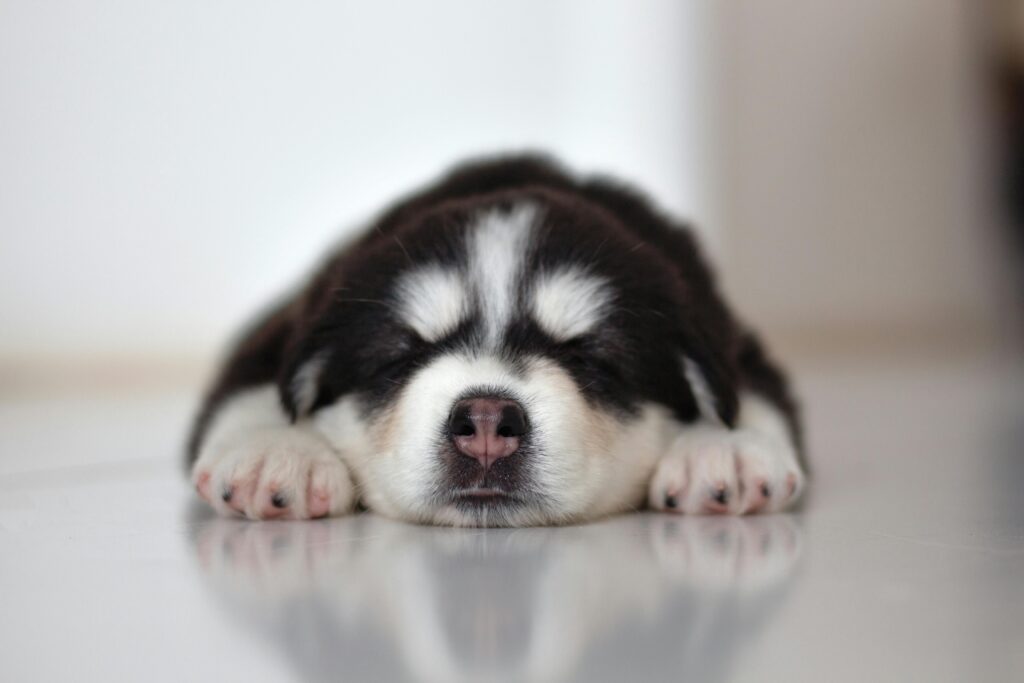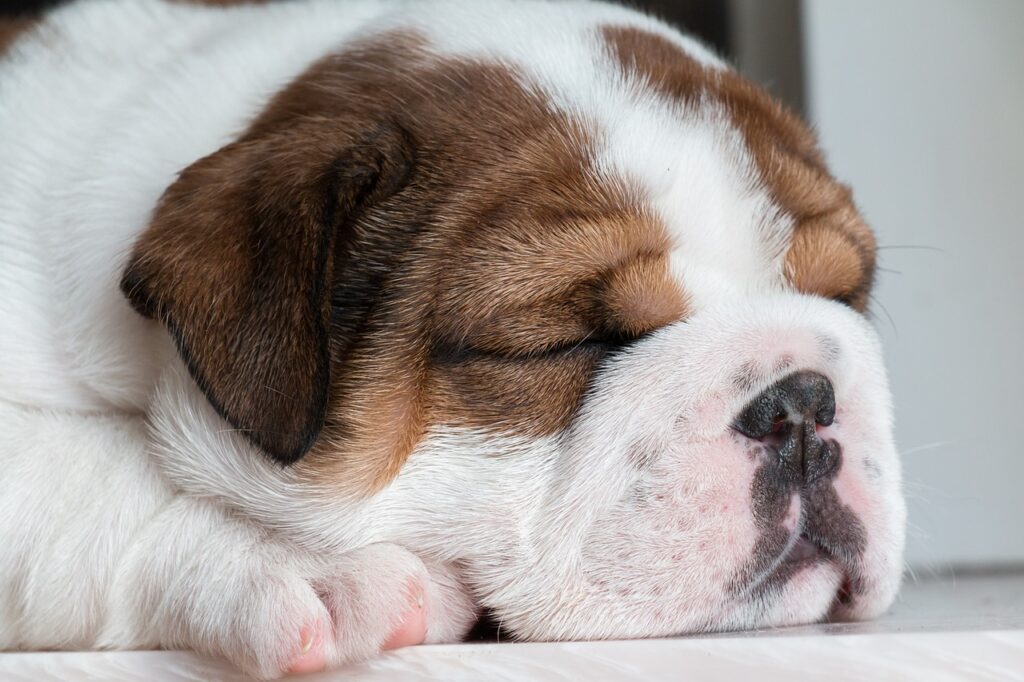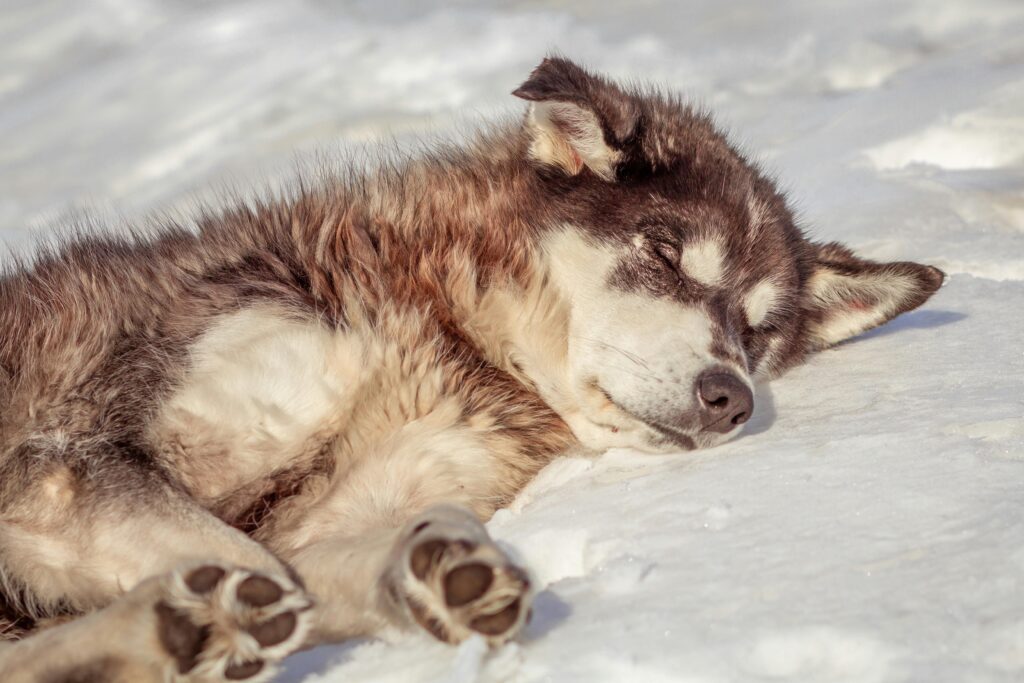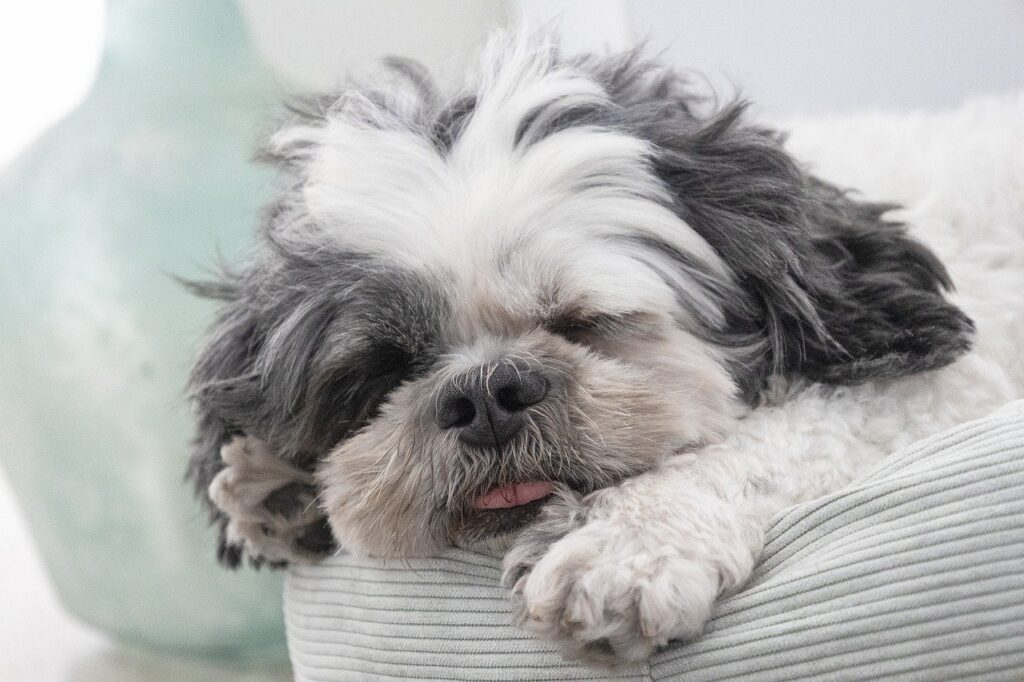Puppies follow a very strict sleep schedule! Let’s look at it by age:-
1. Newborn Puppies (ages 0–2 weeks):- These tiny, wriggly furballs resemble tiny alarm clocks. Even though they sleep a staggering 18 to 20 hours a day, their slumber isn’t particularly restful. They move and talk even while they’re sleeping. It appears as though they are getting ready for their next adventures!
2. Transitional Stage (14 days or older):- Puppies become more aware of their environment, begin to open their eyes, and develop better hearing. They develop separate cycles of light and deep sleep during this time. Their little brains seem to be upgrading!
3. Around (16 weeks of age):- Puppies sleep for about 10.5 hours a day on average at this age. With their increased mobility, they are not only travelling the world but also continuing to catch those Zs.
4. Around (12 Months Old):- Puppies’ requirements for sleep lessen as they get older. They get a little over ten hours of sleep every day at the age of twelve months. They seem to be making the move from puppyhood to growing adulthood as dogs.
Now, why is puppies sound sleep crucial for these adorable little bundles of fur? Just like us, they may become more prone to health problems, irritability, and overexcitement if puppies don’t get enough sleep. Furthermore, you sleep better the better your puppy sleeps! So let’s toast to happy dreams for canines and their owners.


How can I help my puppies sleep better?
The following advice will help your puppies sleep better:-
Establish a Cosy Sleeping Environment:-
- Comfortable Bed:- Get your puppy a cosy bed or crate. Verify that it offers support and is soft.
- Dark and Quiet:- Select a place for them to sleep that is both dark and quiet. Like people, puppies sleep better in a quiet environment.
2. Regular Bedtime Schedule:-
- Create a regular bedtime schedule. Puppies enjoy consistency sleep in their lives.
- Regular Schedule:- Make an effort to bedtime your puppy at the same time every night. Their internal clock is regulated by consistency.
3. Engaging in Physical Activity During the Day:-
- Puppies are incredibly energetic:- Make sure they have adequate time to play and exercise during the day.
- Tire Them Out:- A puppy that is fatigued will slumber more soundly. Play, go for walks, and challenge your mind.
4. Limit Water and Food Before Bed:-
- Refrain:- giving your puppy a meal just before going to bed. Discomfiture can result from a full stomach.
- Potty Break:- To avoid mishaps, take them outside for a potty break right before bed.
5. Comfort Items:-
- Soft Toys:- Offer cuddly blankets or soft toys. Puppies may find comfort in these.
- Mom’s Scent:-If at all possible, use a cloth scented with your own or their littermates’ scents. It may calm them.
6. Prevent Overstimulation:-
- Minimize Screen Time:- It’s true that screens can overstimulate puppies. Before going to bed, avoid making loud noises or watching videos.
- Calm Conversations:- Prior to going to bed, keep conversations civil and quiet.
7. Have Patience and Be Firm:-
- Puppies may cry or whine at first:- It’s typical. Remain calm and resist caving in to their pressure.
- No Midnight Play:- Refrain from playing with your puppy after dark, despite how alluring it may seem. Remain calm and subdued.


What if my puppies is still restless at night?
Don’t worry if your puppy continues to be restless at night. Here are some more suggestions to calm your furry friend and encourage sounder sleep:-
1. Relaxing or white noise:-
- Try turning on some relaxing music or gentle white noise. It can produce a calming atmosphere and block out other noises.
- Because the sound of a ticking clock imitates the heartbeat of their mother, some puppies find solace in it.
2. Security and Warmth:-
- To offer warmth, use a snuggle-safe heat pad made for pets. Warm puppies frequently have a stronger sense of security.
- Cozy blankets and plush animals can also be comforting.
3. Light Petting or Massaging:-
- Give your puppy a light petting or massaging session before night. They may feel more at ease as a result.
- Pay attention to their back, shoulders, and neck. Steer clear of tickling their paws or belly.
4. Treat-dispensing or safe chew toys:-
- Provide toys that can be chewed safely. Chewing may be calming to puppies and Verify that the toys are suitable for their size and age.
- Having a full bladder can occasionally cause restlessness. Take your puppy for a brief bathroom break outside.
- Remain composed and quiet; don’t play during these after-hours excursions.
6. Refrain from feeding your puppy late at night:-
- If your puppy wakes up hungry, give them a small snack but don’t give them a full meal.
- A bloated stomach can cause sleep disturbances, just as a hungry puppy can be restless.
7. Patience and Consistency:-
- Puppies require some time to get used to new routines. Remain steadfast and patient.
- Prevent making abrupt adjustments or disturbing their sleeping environment.
Recall that puppies take in everything around them, much like tiny sponges. Your soothing and composed demeanour can have a significant impact. Your puppy will eventually fall asleep peacefully.


Is your puppies getting too much sleep?
Let’s think about this dog puzzle:-
Envision your adorable pet curled up in a warm bed, dreaming of rolling around in a field of goodies and chasing squirrels. The life of a puppy, ah! How can you tell, though, if your dog is catching too many Z’s? Let’s dissect it:
1. The Sleepy Scale:-
- Too Much:- It may be too much if your puppy naps for longer than a cat in a sunbeam.
- Just Right:- A well-rested puppy is playful, alert, and eager to go on new experiences.
- Too Little:- Your dog may require extra sleep if they are more wired than a tangled leash.
2. Age Matters:-
- Newborns:- These adorable little creatures sleep like pros. They put in an astounding 18–20 hours a day at work. They seem to be getting ready for the Puppy Olympics!
- Transitional Phase:- At the age of 14 days, they begin to open their eyes and investigate their surroundings. Puppies sleep patterns get more pronounced.
- At 16 weeks old:- puppies still require 10.5 hours of sleep per day. They resemble tiny, energy-saving devices.
- 12 months old:- As they get older, they require less sleep. Approximately ten hours a day—similar to a dog nap.
3. Indices of Excessive Sleep:-
- Lethargy:- Too much sleep could be the cause of your dog’s sluggishness or lack of interest.
- Lack of Play:- Puppies ought to occasionally show signs of play. If they seem to be napping all the time, it’s time to look into it.
- Check the Tail-Wag-O-Meter:- Everything is good if the tail wags enthusiastically. If it seems more like a sporadic flick, there may be a problem.
4. Dreams of Puppies:-
Puppies do dream In their sleep, you might notice them woofing softly or twitching, or paddling their paws. In dreamland, they’re presumably chasing squirrels.
5. Improvements:-
o Routine:- Establish a regular sleep schedule. Puppies enjoy consistency in their lives.
o Physical Activity:- Playtime and daytime strolls aid in sleep regulation.
o Comfort Zone:- Establish a comfortable sleeping space with a soft bed, low lighting, and calming music.

